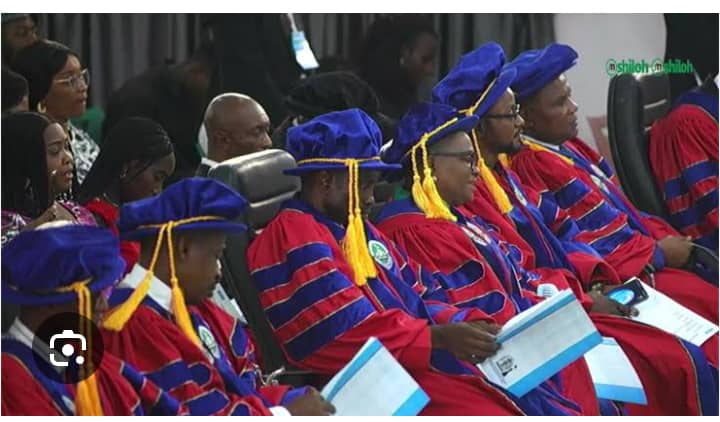
For decades, the Nigerian university system was the envy of Africa, producing world-class graduates, groundbreaking research, and intellectual leaders who shaped the nation and the continent. Today, that ivory tower is showing alarming cracks, and at the heart of this structural weakness is a deeply demoralised and undervalued academic workforce. The conversation around educational reform is often vast and complex, but one critical lever for immediate and transformative change is surprisingly straightforward: a significant and sustainable increase in the remuneration of Nigeria’s university professors.
 The current compensation package for a professor in Nigeria, often delayed and eroded by inflation, is not merely inadequate; it is a national paradox. We task these individuals with moulding the next generation of engineers, doctors, economists, and leaders. We expect them to conduct cutting-edge research that solves local problems and elevates Nigeria’s global standing. Yet, we compensate them in a manner that forces the best minds to focus on survival rather than scholarship. This dissonance is the primary catalyst for the brain drain, declining standards, and intellectual stagnation plaguing our universities.
The current compensation package for a professor in Nigeria, often delayed and eroded by inflation, is not merely inadequate; it is a national paradox. We task these individuals with moulding the next generation of engineers, doctors, economists, and leaders. We expect them to conduct cutting-edge research that solves local problems and elevates Nigeria’s global standing. Yet, we compensate them in a manner that forces the best minds to focus on survival rather than scholarship. This dissonance is the primary catalyst for the brain drain, declining standards, and intellectual stagnation plaguing our universities.
The Direct Link Between Pay and Quality Delivery
The argument for better pay is not just about fairness; it is a strategic investment in educational quality with tangible returns:
1. Curbing the Crippling Brain Drain: The most visible symptom of poor remuneration is the mass exodus of top-tier academics to universities abroad and private sectors at home. When a professor can multiply their income and gain access to better research facilities elsewhere, the nation loses not just a teacher, but an entire repository of knowledge, experience, and mentorship. Retaining this intellectual capital is the first step towards rebuilding. A competitive salary makes the choice between serving one’s country and seeking personal prosperity a less painful one.
2. Fostering a Research Culture: Quality education is inextricably linked to research. It ensures teaching is dynamic, current, and informed by the latest discoveries. However, meaningful research requires uninterrupted time, focus, and resources. When professors are compelled to take on multiple adjunct roles, run side businesses, or engage in endless “consultancies” just to make ends meet, their capacity for deep, impactful research diminishes. Improved remuneration would allow academics to dedicate themselves more fully to their primary mandate: creating and disseminating knowledge.
3. Restoring Dignity and Motivation: The constant financial struggle is demeaning and deeply demotivating. It is difficult to inspire excellence in students when you are preoccupied with how to pay your children’s school fees or cover a medical bill. A respectable salary restores the dignity of the academic profession, boosting morale and rekindling the passion that drew these individuals to academia in the first place. A valued professor is an inspired teacher, and an inspired teacher produces exceptional students.
4. Attracting the Best and Brightest: The current system discourages young, brilliant PhD holders from pursuing academic careers. They see the financial struggle of their mentors and opt for more lucrative paths in industry, finance, or technology. This creates a dangerous generational gap. Enhancing professors’ pay makes academia an attractive career proposition for top talent, ensuring a vibrant and sustainable pipeline of future intellectual leaders for the nation.
Beyond the Pay Cheque: A Holistic Approach
While increased remuneration is the cornerstone, it must be part of a broader package of reforms to be fully effective. This includes:
· Regular and Timely Payment: A raised salary that is consistently delayed defeats its own purpose. The government and university administrations must guarantee the prompt payment of salaries.
· Investment in Infrastructure: Better pay must be coupled with improved libraries, laboratories, internet connectivity, and research grants. A well-paid professor in a dilapidated institution is only half-empowered.
· Academic Autonomy: Professors must be granted the intellectual freedom to pursue lines of inquiry and teach without undue political or bureaucratic interference.
A Call for National Priority
Critics may argue that the nation cannot afford such an increase. The more pertinent question is: can we afford not to? The cost of a failing education system—in terms of unemployable graduates, stunted innovation, and perpetual dependency on foreign expertise—is exponentially higher than the investment required to fix it.
The Federal Government, through the Federal Ministry of Education and the National Universities Commission (NUC), must engage in good-faith negotiations with academic unions to design a realistic, sustainable, and markedly improved remuneration package. This should be viewed not as a concession, but as a critical national investment in human capital development.
Increasing the remuneration of Nigeria’s professors is more than an economic adjustment; it is a powerful statement of intent. It declares that we value knowledge, we honour excellence, and we are finally ready to reinvest in the very engine of our national development: our universities. The future of Nigeria’s competitiveness, innovation, and prosperity depends on the quality of education we provide today. That quality begins by valuing those who deliver it.
Written from Lokoja
By Alao Adamadamosi Sunday arpa
